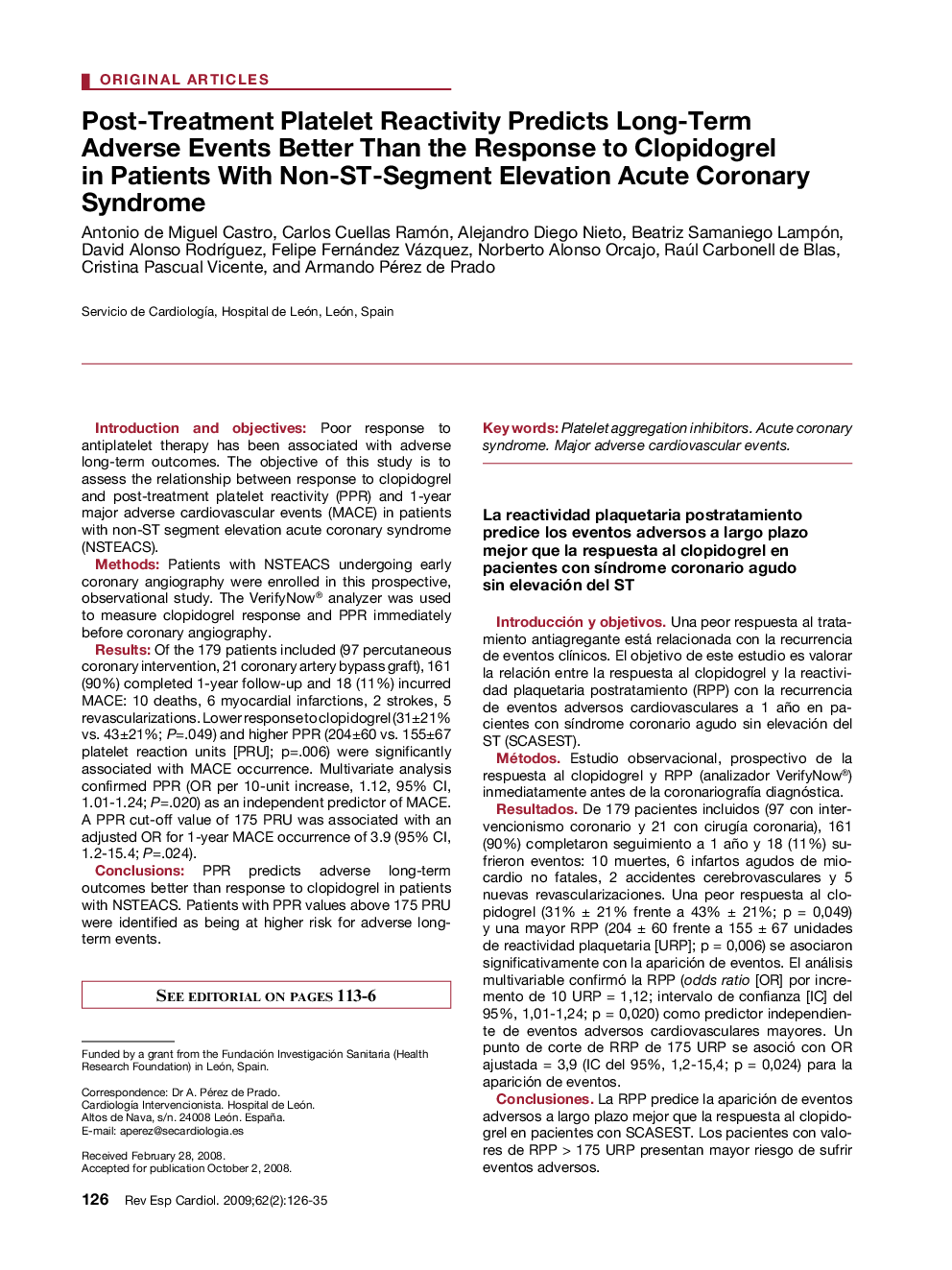| Article ID | Journal | Published Year | Pages | File Type |
|---|---|---|---|---|
| 3019158 | Revista Española de Cardiología (English Edition) | 2009 | 10 Pages |
Introduction and objectivesPoor response to antiplatelet therapy has been associated with adverse long-term outcomes. The objective of this study is to assess the relationship between response to clopidogrel and post-treatment platelet reactivity (PPR) and 1-year major adverse cardiovascular events (MACE) in patients with non-ST segment elevation acute coronary syndrome (NSTEACS).MethodsPatients with NSTEACS undergoing early coronary angiography were enrolled in this prospective, observational study. The VerifyNow® analyzer was used to measure clopidogrel response and PPR immediately before coronary angiography.ResultsOf the 179 patients included (97 percutaneous coronary intervention, 21 coronary artery bypass graft), 161 (90%) completed 1-year follow-up and 18 (11%) incurred MACE: 10 deaths, 6 myocardial infarctions, 2 strokes, 5 revascularizations. Lower response to clopidogrel (31±21% vs. 43±21%; P=.049) and higher PPR (204±60 vs. 155±67 platelet reaction units [PRU]; p=.006) were significantly associated with MACE occurrence. Multivariate analysis confirmed PPR (OR per 10-unit increase, 1.12, 95% CI, 1.01-1.24; P=.020) as an independent predictor of MACE. A PPR cut-off value of 175 PRU was associated with an adjusted OR for 1-year MACE occurrence of 3.9 (95% CI, 1.2-15.4; P=.024).ConclusionsPPR predicts adverse long-term outcomes better than response to clopidogrel in patients with NSTEACS. Patients with PPR values above 175 PRU were identified as being at higher risk for adverse long-term events.
Introducción y objetivosUna peor respuesta al tratamiento antiagregante está relacionada con la recurrencia de eventos clínicos. El objetivo de este estudio es valorar la relación entre la respuesta al clopidogrel y la reactividad plaquetaria postratamiento (RPP) con la recurrencia de eventos adversos cardiovasculares a 1 año en pacientes con síndrome coronario agudo sin elevación del ST (SCASEST).MétodosEstudio observacional, prospectivo de la respuesta al clopidogrel y RPP (analizador VerifyNow®) inmediatamente antes de la coronariografía diagnóstica.ResultadosDe 179 pacientes incluidos (97 con intervencionismo coronario y 21 con cirugía coronaria), 161 (90%) completaron seguimiento a 1 año y 18 (11%) sufrieron eventos: 10 muertes, 6 infartos agudos de miocardio no fatales, 2 accidentes cerebrovasculares y 5 nuevas revascularizaciones. Una peor respuesta al clopidogrel (31% ± 21% frente a 43% ± 21%; p = 0,049) y una mayor RPP (204 ± 60 frente a 155 ± 67 unidades de reactividad plaquetaria [URP]; p = 0,006) se asociaron significativamente con la aparición de eventos. El análisis multivariable confirmó la RPP (odds ratio [OR] por incremento de 10 URP = 1,12; intervalo de confianza [IC] del 95%, 1,01-1,24; p = 0,020) como predictor independiente de eventos adversos cardiovasculares mayores. Un punto de corte de RRP de 175 URP se asoció con OR ajustada = 3,9 (IC del 95%, 1,2-15,4; p = 0,024) para la aparición de eventos.ConclusionesLa RPP predice la aparición de eventos adversos a largo plazo mejor que la respuesta al clopidogrel en pacientes con SCASEST. Los pacientes con valores de RPP > 175 URP presentan mayor riesgo de sufrir eventos adversos.
